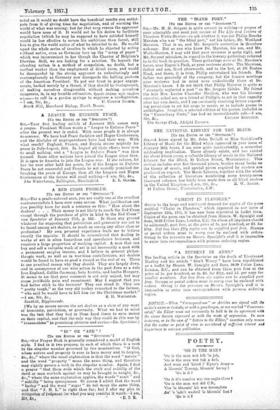A RED CROSS PROBLEM. Fro THS EDITOR or THE "SPECTATOR."]
Ssz,—For a gentle-natured man, you are really one of the cruellest controversialists I have ever come across. What justification can you possibly have for such a sentence as this : " How about the dealers? . . . Their money is not likely to reach the Red Cross except through the purchase of gifts in kind to the Red Cross" (see Spectator of January 27th, p. 102). Is there any ground whatever for supposing that patriotism and generosity are not to be found among art dealers, as much as among any other class or profession? My own personal experience leads me to believe exactly the opposite. It should be remembered that dealing in works of art is often hazardous and speculative business, and requires a large proportion of working capital. A man that can buy and sell a valuable work of art is not necessarily a man with a permanent surplus income, and I believe in general philan- thropic work, as well as in war-time contributions, art dealers would be found to have as good a record as the rest of us. There is one practical reason why they should. They are largely Jews, and in consequence of our wise action in the past Jews as a rule love England, dislike Germany, hate Austria, and loathe Hungary. It seems to me that your comment is not only unjust, but may cause justifiable pain and -resentment. May I suggest that you had better stick to the brewers? They can stand it. They are " pretty tough," as the very old turkey remarked to the farmer, " who said he would have to kill him for the -Christmas market."
Southill, Biggleswade.
[We by no means accuse the art dealers as a class of any want of humanity, patriotism, or generosity. What we had in mind was the fact that they had in these hard times to earn money ou their capital, and that the only way they could do this was by "transactions" in promising pictures and curios.—ED. Spectator.]






































 Previous page
Previous page